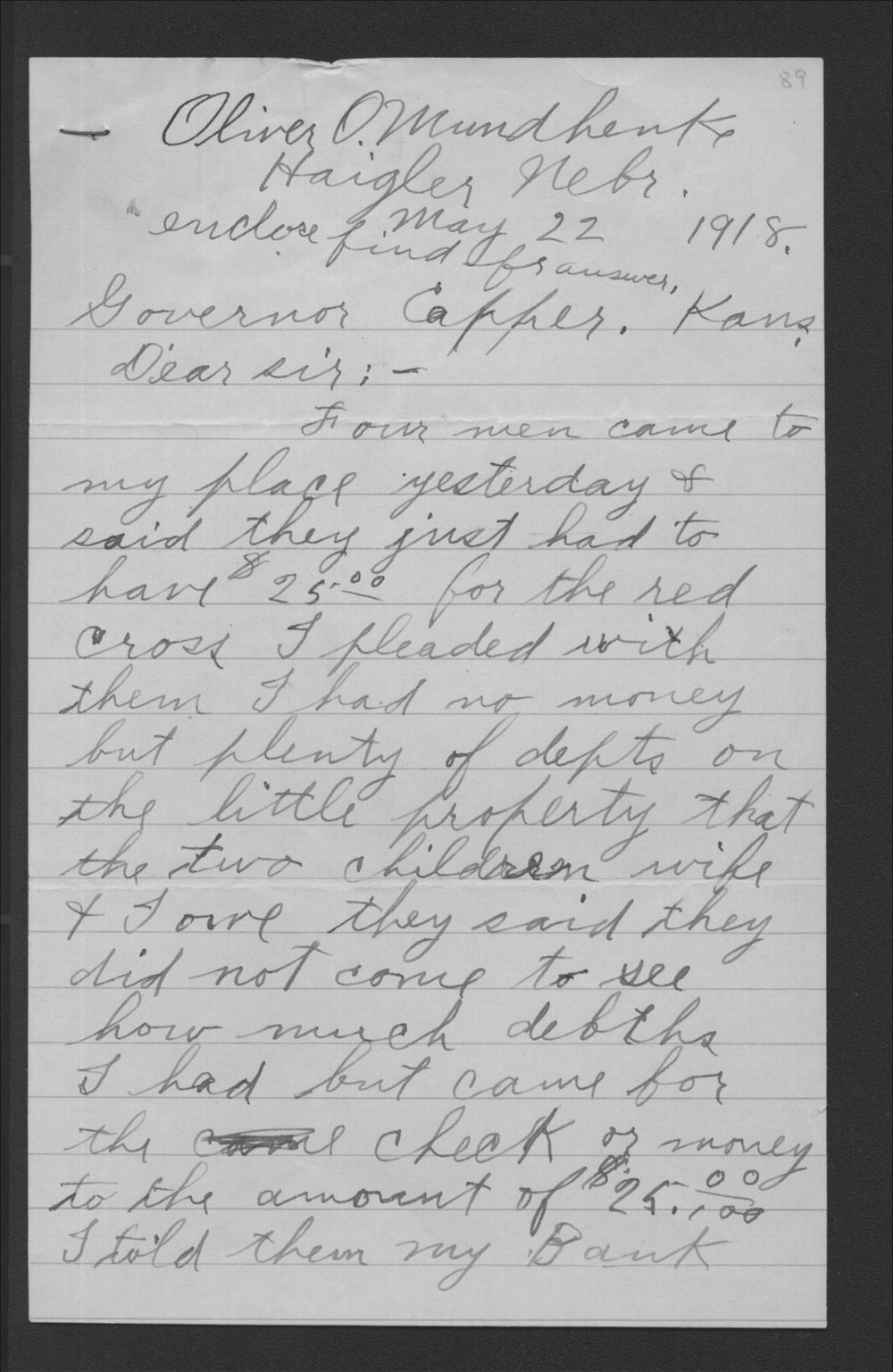 When a flag appeared near the home of Phil Crab of Ada, Kansas, in 1918, it wasn’t in celebration. The flag read SLACKER and meant to shame Mr. Crab into a donation to support the war, a request he had earlier refused. When some residents threatened to paint his house yellow, a series of threats and allegations ensued between Crab and local patriots that ultimately involved Governor Arthur Capper. Though Ada was a small town on the western edge of Ottawa County in north central Kansas, it was not immune to the patriotic fervor and anti-German hysteria sweeping the country. With America’s entry into WWI, many people sought to root out the “anti-American” elements in their midst and in doing so uncovered deep divisions in their communities that may, or may not, have had anything to do with patriotism. Governor Capper’s “slackers” file is now available on Kansas Memory.
When a flag appeared near the home of Phil Crab of Ada, Kansas, in 1918, it wasn’t in celebration. The flag read SLACKER and meant to shame Mr. Crab into a donation to support the war, a request he had earlier refused. When some residents threatened to paint his house yellow, a series of threats and allegations ensued between Crab and local patriots that ultimately involved Governor Arthur Capper. Though Ada was a small town on the western edge of Ottawa County in north central Kansas, it was not immune to the patriotic fervor and anti-German hysteria sweeping the country. With America’s entry into WWI, many people sought to root out the “anti-American” elements in their midst and in doing so uncovered deep divisions in their communities that may, or may not, have had anything to do with patriotism. Governor Capper’s “slackers” file is now available on Kansas Memory.
 In this May 4, 1918, response to J. M. Best of Clyde, Kansas, Governor Capper outlines his approach for dealing with persons suspected of being disloyal to the United States government, an attitude he called “slackerism.” Best wrote the governor to inform him of disloyal citizens in his community.
In this May 4, 1918, response to J. M. Best of Clyde, Kansas, Governor Capper outlines his approach for dealing with persons suspected of being disloyal to the United States government, an attitude he called “slackerism.” Best wrote the governor to inform him of disloyal citizens in his community.
Secretary to the governor, Charles Sessions, of Topeka, writes this July 6, 1917, letter to U.S. District Attorney Fred Robertson at Kansas City to request he send secret service agents to Wilson, Kansas, to investigate suspected German sympathizers.
Oliver Omunhenke of Haigler, Nebraska, writes this May 22, 1918, letter to Governor Capper to complain about threats from persons requesting a wartime donation to the Red Cross. He explains that he cannot afford such a donation and wrote of the group “If I did not write a check in 15 minutes they would attend to me.”
In this May 25, 1918, letter to Governor Capper, Dr. Charles Butcher, a veterinarian in Russell, Kansas, states that accusations against him by another resident were made “maliciously and revengefully” and have nothing to do with his loyalty to the U. S. government. He states “I will give to the Red Cross in due time just as soon as these Parisites [sic] quit trying to sting me.”
The entire “slackers” file from Governor Arthur Capper’s records in the Kansas State Archives is now available on Kansas Memory. For additional materials on WWI select the category Military--Wars--World War I.
For a more detailed analysis of this issue, see James C. Juhnke, “Mob Violence and Kansas Mennonites in 1918.” Kansas Historical Quarterly, Autumn, 1977 (Vol. 43, No. 3), pages 334 to 350.


